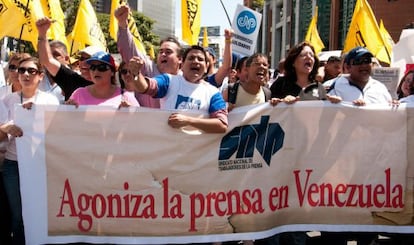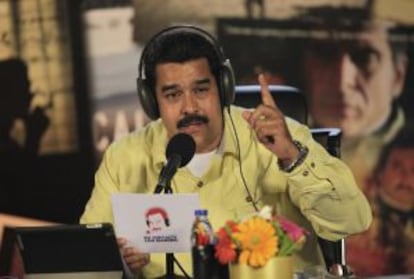Venezuela to spend more on media control despite economic crisis
Nicolás Maduro administration slates 3.6 billion bolivares for investment in partisan outlets

A new media mogul has emerged in Venezuela: the state.
Despite an economic crisis that is bringing public finances to its knees, the self-proclaimed Bolivarian Revolution controls 14 television channels, a global satellite network (TeleSur), four newspapers – soon to be five – and dozens of radio stations.
The mission of this media empire is to “promote the government’s actions, support socialist values and drive forward the revolution,” as worded in the executive’s recent 2015 budget proposal.
In order to finance just part of this conglomerate, the Nicolás Maduro administration is planning to invest 3.6 billion bolivars next year – equivalent to slightly over $508 million according to the official exchange rate, but only €64.7 million under Venezuela’s controversial exchange system.
The government is simultaneously planning to use its parliamentary majority to pass a law that will allow it to directly fund over 500 community stations sympathetic to former president Hugo Chávez, bypassing local authorities.
The late Chávez always considered the media a key battleground in his quest to establish a Bolivarian regime based on his own interpretation of socialism, populism and Latin American regionalism. Now his successor, Nicolás Maduro, is following in his footsteps.
The figures on state control of the media were drawn up by Marcelino Bisbal, director of postgraduate media studies at the Andrés Bello Catholic University (UCAB) in Caracas, a Jesuit-run learning center.
“We took all the items earmarked for communication in the budget law, and the largest share corresponded to the Information and Communication Ministry,” said the scholar.

Even though this renewed investment effort “maintains no relation to the low audience ratings of the state-owned media,” Bisbal said the logic behind it was “the state’s desire to fill all areas of public life. And while it is true, as state spokesmen say, that there are still many more private outlets than public ones, they are intimidated and self-censoring, and dominated by the official truth.”
The 3.6 billion bolivars slated for investment in the media surpasses the money allocated to the judicial and electoral branches of government, two of the five powers granted to the state under the 1999 Constitution. That is despite the fact that 2015 is an election year, a fact that normally requires additional funding for the National Electoral Council.
That kind of money would be enough to build 301 schools, according to calculations by Maru Morales, a reporter for Caracas daily El Nacional.
Tu suscripción se está usando en otro dispositivo
¿Quieres añadir otro usuario a tu suscripción?
Si continúas leyendo en este dispositivo, no se podrá leer en el otro.
FlechaTu suscripción se está usando en otro dispositivo y solo puedes acceder a EL PAÍS desde un dispositivo a la vez.
Si quieres compartir tu cuenta, cambia tu suscripción a la modalidad Premium, así podrás añadir otro usuario. Cada uno accederá con su propia cuenta de email, lo que os permitirá personalizar vuestra experiencia en EL PAÍS.
¿Tienes una suscripción de empresa? Accede aquí para contratar más cuentas.
En el caso de no saber quién está usando tu cuenta, te recomendamos cambiar tu contraseña aquí.
Si decides continuar compartiendo tu cuenta, este mensaje se mostrará en tu dispositivo y en el de la otra persona que está usando tu cuenta de forma indefinida, afectando a tu experiencia de lectura. Puedes consultar aquí los términos y condiciones de la suscripción digital.








































